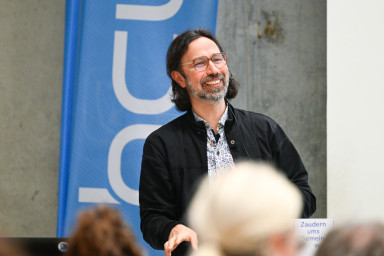17 Dec, 2024, 17:00Auditorium, HCU
Prof. Dr. Ignacio Farías (Humboldt University of Berlin)
Zaudern ums Gemeinwohl: Equivocal experiments in cooperative urban development

Image © Clara Mross.
Abstract
Cooperative urban development is the buzzword of the moment. It stands for the quest for a fairer city that is oriented towards the common good. In new partnerships – public-civic partnerships – actors from politics and administration work together with actors from civil society. Drawing on our book Zaudern ums Gemeinwohl [Dithering over the common good] (Farías, Marlow, Wall; ADOCS Verlag 2024), I will analyse Berlin’s model projects for cooperative urban development as equivocal experiments in the democratization of expertise. In a context of radical uncertainty about the future of cities, Haus der Statistik and Rathausblock Kreuzberg have been made possible by productive misunderstandings, i.e. strategically chosen concepts or visions that allow for medium-term cooperation between civil society and the city administration – despite different or even conflicting ideas, interests, and criteria regarding urban design. What is a model project? What does cooperation mean? What does it mean to be oriented towards the common good? These are equivocal spaces that public and civil society actors navigate in an experimental way, and where dithering over the common good becomes a crucial practice.
Bio
Ignacio Farías is a professor of urban anthropology and the director of the Georg Simmel Center for Urban Studies and co-director of the Stadtlabor for Multimodal Anthropology at Humboldt University of Berlin. His research interests focus on current ecological and infrastructural transformations of cities and the associated epistemo-political challenges to the democratization of city-making. His most recent work explores the politics of environmental disruptions, from tsunamis to heat to noise, as well as urban ethnography as a mode of city-making performed with others (designers, initiatives, concerned groups, policy-makers) and by other means (moving from textual to material productions).